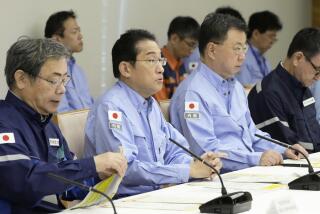Japanese Hold No Grudge, He Tells American Friend : For Hiroshima Surgeon, a Lifetime of Healing
- Share via
TOKYO — Dr. Tomin Harada, 73, is seeing old friends today in Hiroshima.
Barbara Reynolds, who years ago helped him establish a “World Friendship Center” in Hiroshima, arrived Saturday with Norman Cousins and Dr. Bernard E. Simon of Mt. Sinai Hospital in New York City to attend today’s 40th anniversary commemoration of the world’s first atomic attack. The bomb was dropped on Hiroshima at 8:15 a.m. on Aug. 6, 1945.
Reynolds, Cousins and Simon spent years of their lives trying to spread the “message of Hiroshima” and to help treat its victims--the ones for whom suffering and worry only began on that day 40 years ago.
Through their efforts, the three Americans became friends of Harada. (Simon, a plastic surgeon, operated on about 150 of the more than 200 Hiroshima wounded whom Cousins helped send to New York with American contributions.)
Over 86,000 Killed
For 86,141 others, life ended in a flash on Aug. 6, according to the Japanese government agency formerly called the Economic Stabilization Board.
In the years after the war, the Hiroshima surgeon devoted nearly all of his professional attention to hibakusha (victims of the bomb), to their keloid scars and strange, unidentifiable illnesses that in Japan have come to be lumped in the single category of “atomic illness.”
A friend, Shigeru Suzuki of Kyodo News Agency, introduced me to Harada in the summer of 1961.
We talked for more than an hour about the dozens of operations he had performed on individuals in an attempt to remove their keloid scars, about the lingering effects of the bomb, the cancer fears of people exposed to radiation, their rejection as marital partners by other Japanese who feared that babies would be born deformed.
No Resentment
Harada said then--and volunteered again in a recent telephone conversation--that Hiroshima people hold no resentment or grudge toward the United States.
Their feelings, however, are recorded in the marble plaque erected in Peace Memorial Park near the center of the explosion that reads, “Rest Ye in Peace, for This Mistake Shall Not Be Repeated.”
It was an emotionally draining experience in 1961 to hear Harada describe so much suffering, far more affecting than the photographs and artifacts of the Atomic Bomb Museum in Peace Park. Those displays depict only a moment of horror.
But then, as I was about to leave, Suzuki inquired about the doctor’s wife. Harada hadn’t mentioned her during the conversation.
“She is not well,” he said quietly. “I’m afraid she is dying of cancer.”
Minutes of Silence
For what seemed like minutes, no one said a word.
Then Harada spoke again, recalling that his wife had been in Hiroshima when the bomb fell.
“As a doctor, I know I can’t blame this on the bomb. But as a human being, I can’t help wondering. . . . “
She died that year, shortly after the 16th anniversary of the Hiroshima bombing.
Three years ago, Harada himself came down with cancer, coming “close to death.”
Not waiting for the obvious question, the doctor recently said no, it was not caused by the bomb. It was “the same as President Reagan”--cancer of the colon.
“I’m well now,” he said. “I’m still running my hospital.”
Harada no longer works at the Atomic Bomb Hospital, which he headed for decades while also running his own private hospital. Treatment of atomic bomb victims has dropped off in recent years, he said, adding, “I’m getting old, so I thought I would resign as a director of the World Friendship Center, too.”
Relating Experiences
The center has financed 16 trips abroad by delegations of bomb victims to relate their experiences in the hope that there will be “no more Hiroshimas.”
Three times, Harada himself has joined the missions. He also has written three books, one of which, “Hiroshima Surgeon,” was translated and published in English by Faith and Life Press in Newton, Kan.
Harada has avoided getting involved in the anti-nuclear activities of the “peace movements” associated with Japan’s leftist parties. He especially avoids organizations that discriminate between nations with “good bombs” and those with “bad bombs.”
“I can only speak quietly, to one person at a time,” he said. “It’s a very slow process.”
More to Read
Sign up for Essential California
The most important California stories and recommendations in your inbox every morning.
You may occasionally receive promotional content from the Los Angeles Times.













